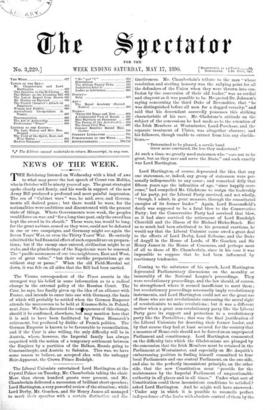Lord Hartington, of course, deprecated the idea that any one
statesman, or, indeed, any group of statesmen were per- sonally indispensable to any cause; and remarked drily that fifteen years ago the infirmities of age, "since happily over- come," had compelled Mr. Gladstone to resign the leadership of his party, yet the Liberal Party survived, and not wholly, "though, I admit, in great measure, through the resuscitated energies of its former leader." Again, Lord Beaconsfield's death was supposed to be a fatal blow to the Conservative Party ; but the Conservative Party had survived that blow, as it had since survived the retirement of Lord Randolph Churchill and the illness of Sir Michael Hicks-Beach. But as so much had been attributed to his personal exertions, he would say that the Liberal Unionist cause owed a great deal to the efforts of Lord Derby, Lord Selborne, and the Duke of Argyll in the House of Lords, of Mr. Goschen and Sir Henry James in the House of Commons, and perhaps most of all to those of Mr. Chamberlain, since in his case it was impossible to suppose that he had been influenced by reactionary tendencies.






































